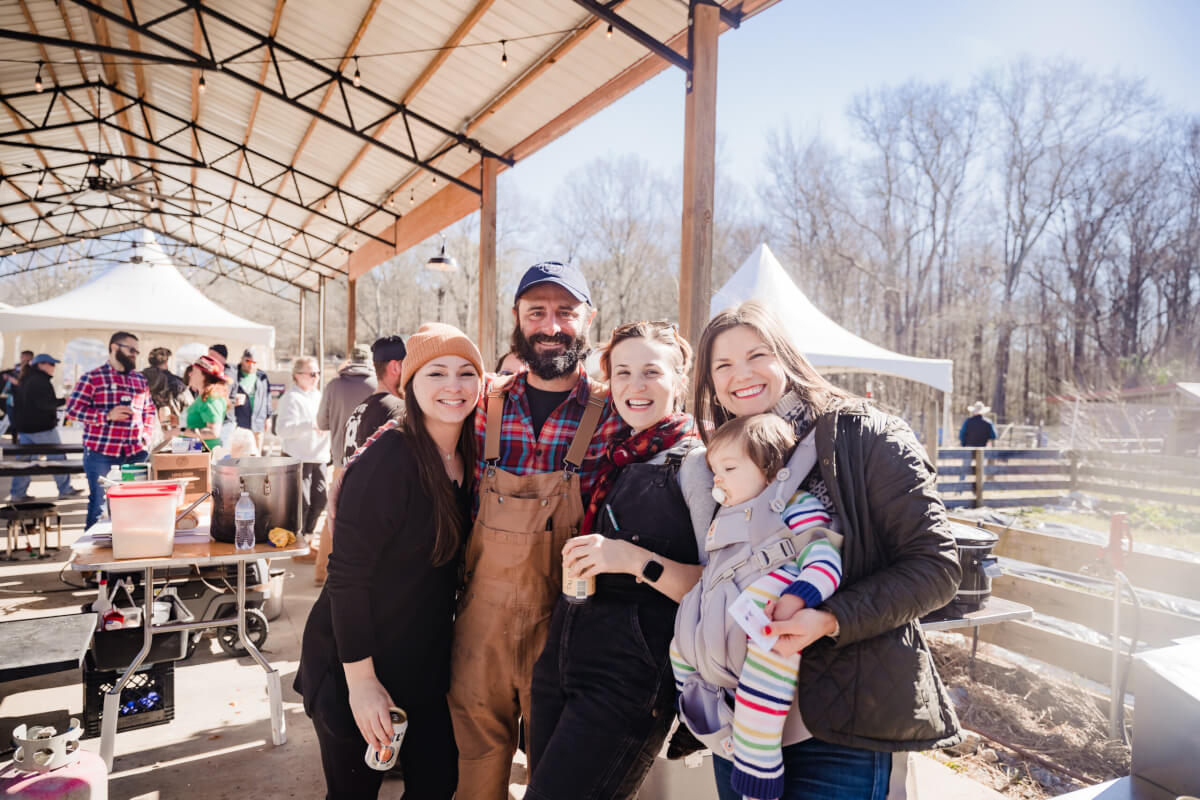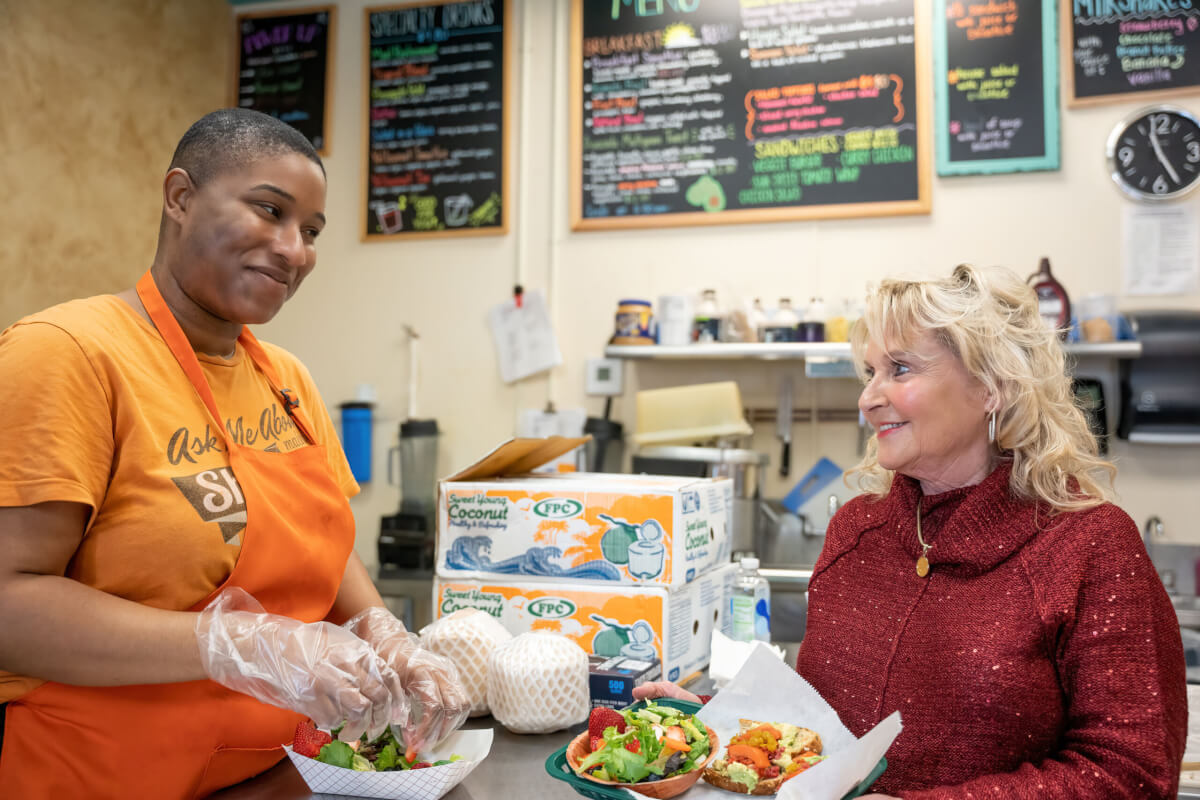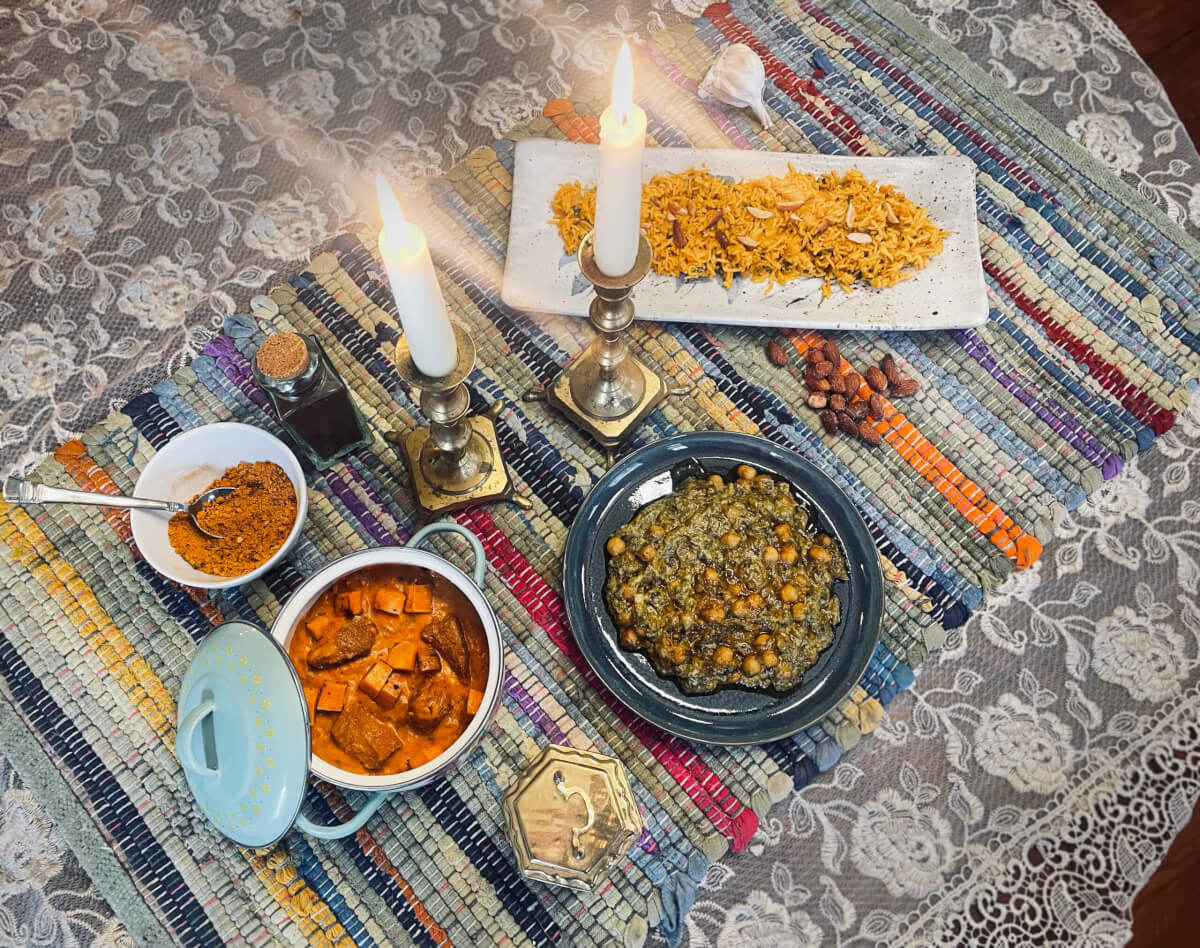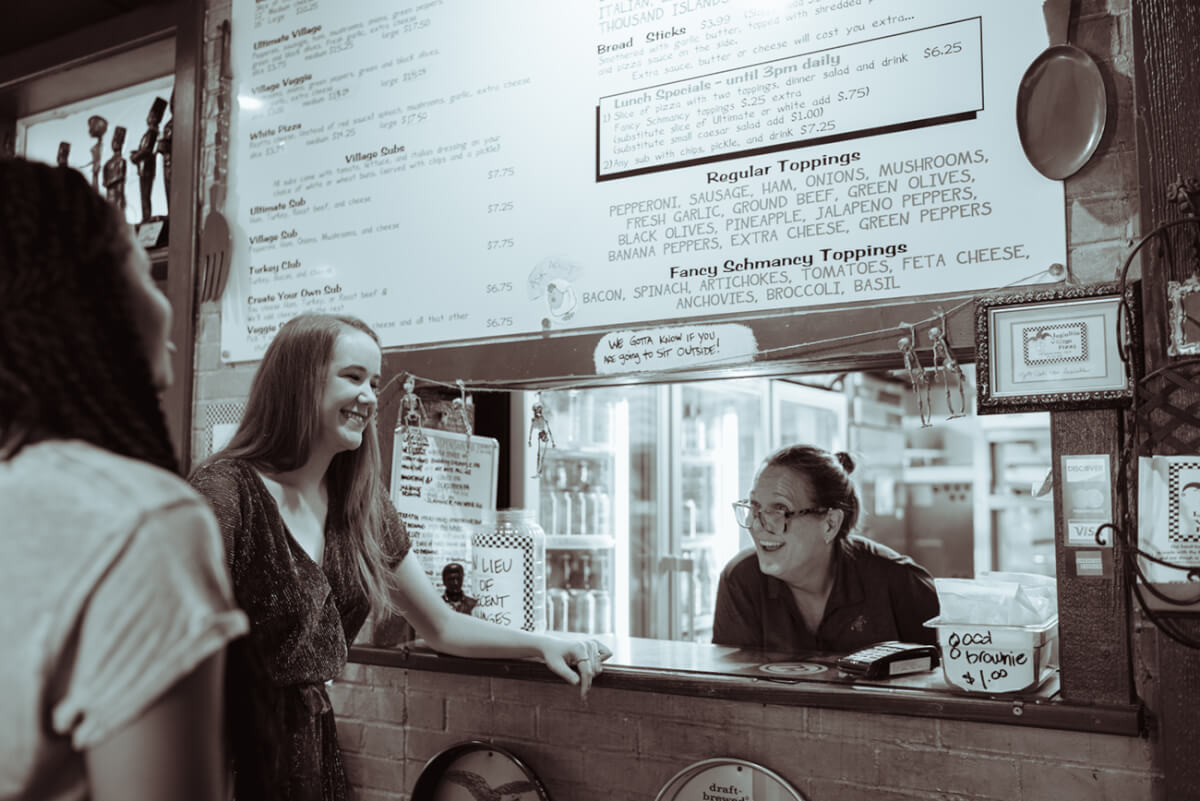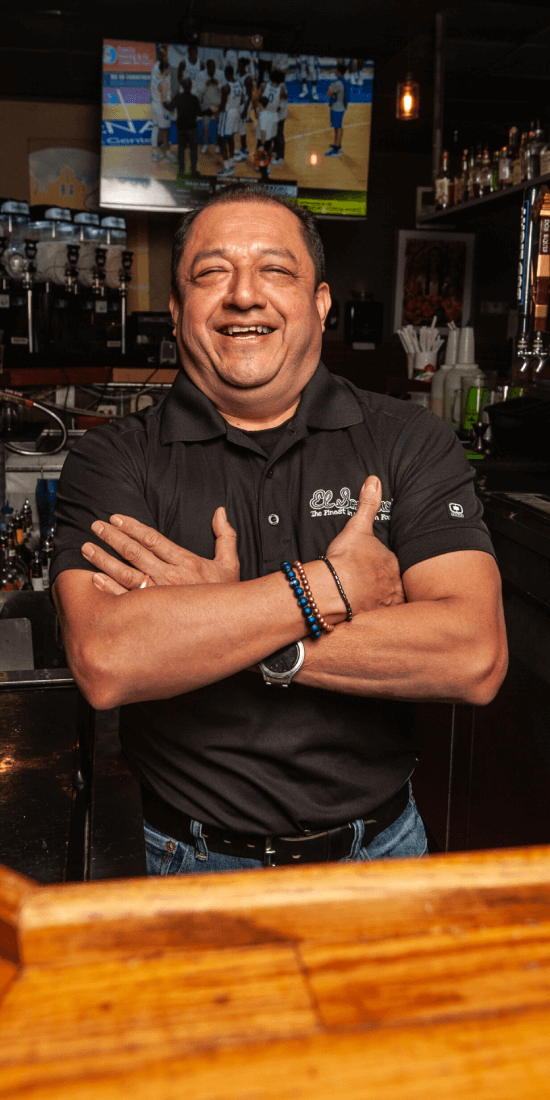
Seasoned in service
By Sierra Stevens
Photography by Dsto Moore
Macon has recently been featured as a top tourist destination in the United States – even globally – by publications like The New York Times, Bloomberg, and Forbes. This heightened exposure is in large part due to the preservation efforts of the Muscogee (Creek) Nation, partnered with local and federal officials, to make the Ocmulgee Mounds a national historic park. Revitalization efforts in city planning, architecture, and the arts are making our city more vibrant than ever. The Cherry Blossom Festival and internationally-important music history have also attracted visitors for generations.
But you can’t travel without eating. If you see an incredible sight, then have an abysmal meal, you’ll leave town with a sour taste in your mouth. Without a robust food scene, visitors won’t stay long. And there’s nothing to eat unless someone’s cooking it and someone’s serving it.
When people visit Macon, the only Maconites that visitors may interact with are often their servers or bartenders when they stop for lunch after, say hiking the trails at Ocmulgee or going out for cocktails after touring Capricorn Records.
What our hospitality and service industry people are doing is not only being Macon’s welcoming committee but also our goodbye, and then sometimes every local contact in between.
Luckily, Macon’s service industry delivers incredible food and service, from veal and Opus One with Valley (Valentine Fernandes) at Natalia’s, grownup milkshakes and homestyle pot roast with Leilani Rodriguez at the Rookery, and fried chicken and dressing so good that Dawson’s Kitchen’s kitchen manager Patsy Bevins has received marriage proposals, to margaritas and chunky guac with Lalo (Eduardo Hernandez) at El Sombrero, paella or prime rib with Julio Rosas at The Back Burner, and shrimp and grits waffles and vintage bourbons with Mike Reynolds at Downtown Grill.
In this food issue, we knew we had to highlight some of the service industry professionals who have been doing that good work, so we sought out those who had been Macon’s foodservice ambassadors for a decade or more.
We want to give these local legends their due space and can’t fit everyone in a single issue, so this will be a recurring series in the food issue. To recommend someone, email hello@maconmagazine.com.
To those featured: We thank you for serving us all so well.
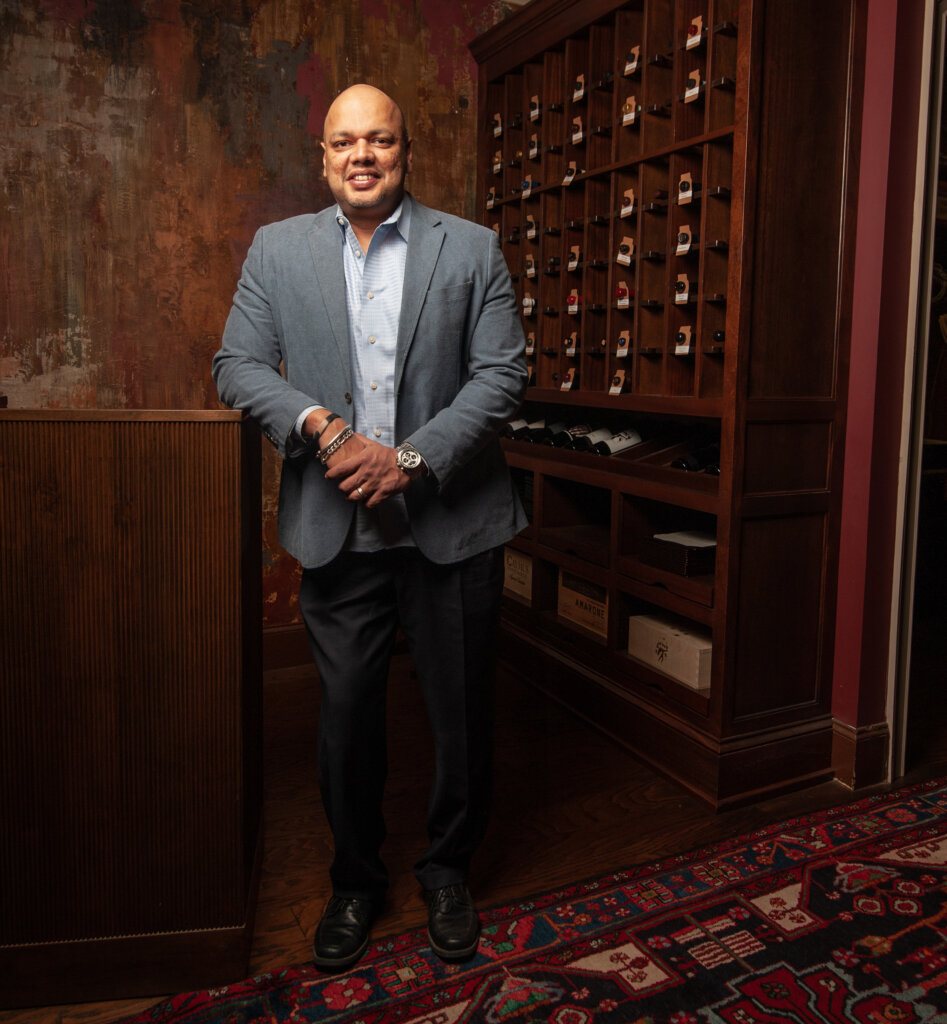
VALENTINE FERNANDES
Valentine Fernandes is an institution. For 25 years, he’s been showcasing old-school fine dining service. His tie is always perfectly pressed, his apron knotted neatly, his wine key at the ready. Ask any regular who Valley is, and they’ll tell you he’s the OG.
Fernandes grew up in Mumbai, Portugal, and Goa (an Indian state south of Mumbai that was once a Portuguese colony) with his Indian-Portuguese family. He moved to The States in 1998 and began working at Natalia’s as a busser. Nowadays, with his big laugh and easy way of talking with anyone (a trait he says is strengthened by his international background), you’d never know that he wasn’t always outgoing.
In the early days, Natalia’s was on Riverside Drive, and the bar was slow. Then Natalia (the founding owner & restaurant’s namesake) hired Daniel Underwood to tend the bar. Fernandes was assigned to bus the bar. Underwood quickly took Fernandes under his wing.
Before the shift, they’d make two espressos and read the Macon Telegraph together, handing each other sections between sips. So they started out the shift energized and with a sense of camaraderie. “I used to be a shy guy until Daniel broke me out of my shell,” Fernandes shared. “But when Natalia hired Daniel, she said, ‘Daniel, you asked me, ‘can you be a bartender?’ No. The real question is, ‘Can you be a joker?’ and Daniel said, ‘That’s exactly what I am.’ And he taught me how to be one too.” Fernandes learned then and there that the most important aspect of service is making guests feel relaxed, understood, and taken care of.
The thing about jokes, Fernandes explained, is that you know something the other person doesn’t. It’s something they’ll enjoy. It will surprise and delight them. You have to know what kind of joke to tell by reading cues about the kind of person they are. The same goes for food service. Customers want you to know things they don’t. They want to be surprised when you find the perfect wine for their dinner or the perfect dinner for their mood – like the punchline that makes the joke. You have to keep people entertained, curious, and ready to interact with you. In other words, you have to make relationships. “And I usually crack a joke right when I get to the table, just to get things rolling,” Valley said mid-chuckle.
In a restaurant, Fernandes shared, “relationships are everything. I love the people I work with. It’s also about building relationships with customers, especially ones I’ve been taking care of so long. I’ve turned kind of into a family member now. It’s rewarding.”
For Fernandes, these relationships extend past the restaurant’s doors. Regulars are a part of his personal life. Some of his regulars are in global sales. “They’ll text me from Japan, South Korea, asking for me to be there when they bring their clients to Natalia’s so I can take care of them,” he said. He’s also made lasting friendships that led to joining hunting trips, riding his motorcycle with biker-guests, and connecting with people over soccer matches or Formula One races. “When people come into town, they let me know they’re coming over so we can have a drink together, something like that. Those are the kind of relationships you build with people over many, many years. And I’ve gotten to do that at Natalia’s. It feels good.”
All that affability requires mindful upkeep, Fernandes insisted. “You can’t be negative in this industry. You smile, and the world will smile back at you. Crack a joke here, crack a joke there to get the shift going. Then you get the job done. With a smile on your face, you can make most people happy. You can’t make everybody happy, but you have to try your best.” The late nights and long hours on your feet can wear you down, but “you have to be proactive about it. Yes, we work late hours, but if you sleep in, the walls will start closing in you. You can’t stay up late, wake up late, and go straight to work. That’s when depression starts.” Instead, he says, “Find the positivity. Start your day off right. For me, I go to the gym. I at least walk in the door, even if I’m going to just play a little minute of racquetball. Do something. The restaurant cannot be your whole life.”
Fernandes also finds positivity in spending time with his wife and son, enjoying meals they make on their Green Egg, “or maybe a nice blackened snapper and some veggies.” Sometimes, a bit of alone time helps, too: “Give me a double carpaccio, a good bottle of red, then leave me alone for 30 minutes. That right there is all the positivity I need.”
Fernandes is grateful to his first restaurant boss, Natalia del Basso Orsini, his mentor, Daniel Underwood, and the rest of the team that showed him the ropes. He’s excited about future as a part of Moonhanger Group (who purchased the restaurant in 2018). “By God’s grace,” Fernandes stated, “it’s been a good run.” When asked whether he’d stop running any time soon, Fernandes joked, “What do you think the gym in the morning is for?” Like Macon, he says, his career “does have a little history to it. But new, exciting things happen every day,” and he’s proud of the part he continues to play in Macon’s food history and future.
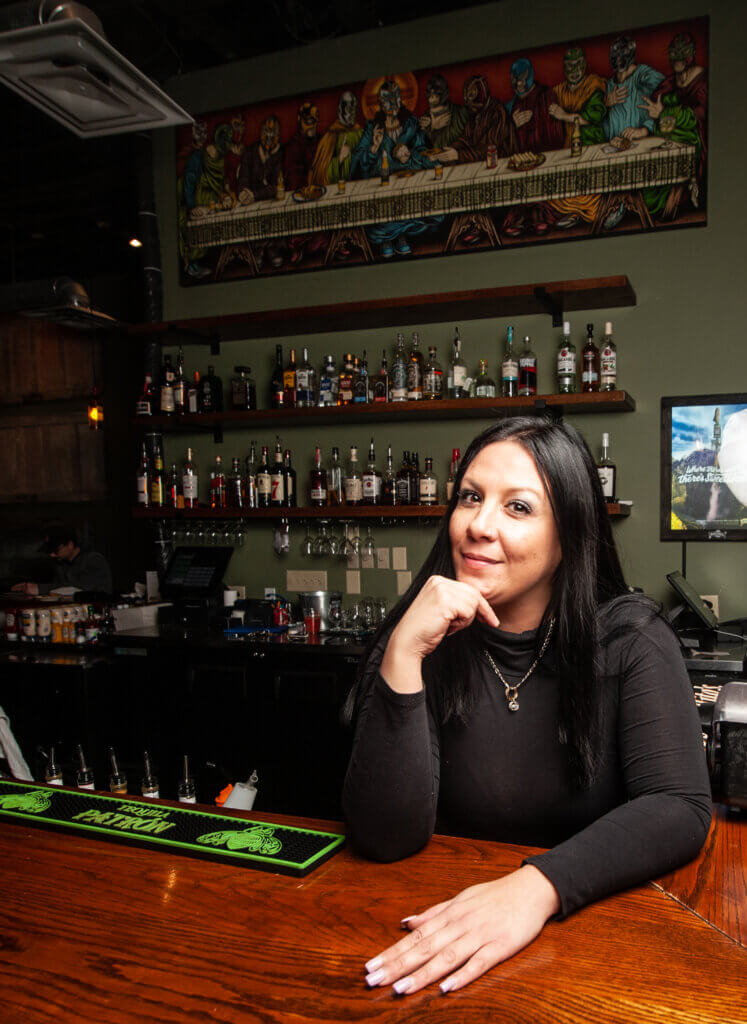
LEILANI RODRIGUEZ
Leilani Rodriguez is loud, tough, and hilarious. She also has a heart of gold. She’s been working in restaurants for 17 years – 14 at Rookery. If you walk into Rookery, look for a surly bar guest. Put your timer on. In about ten minutes, Leilani and that guest will be caught in a fit of side-splitting laughter, or they’ll be grasping hands across the bar, sharing tears of sorrow. (This isn’t an exaggeration – I timed a few of these interactions when I was waiting tables at Rookery in 2018).
Rodriguez explains what inspires her open-hearted service style: “I got into bartending because I was a young, single mom and I couldn’t wait paycheck to paycheck. I needed to feed my boy that day. But I’ve been doing this a long time because it’s not just about the money. It’s about helping people. For instance, I met one couple two or three years ago. They came in for lunch while their daughter was in chemotherapy. Something just told me to come out from behind my bar, and I asked the mom for a hug. From there, we created a friendship that you can’t describe. They still come see me to this day. It happens all the time that people just need someone to play a sister role, or a confidant, or just see someone friendly for once that day. There’s a lot of lonely people in this world. Sometimes a ‘hi’ or a ‘how are you doing’ will go a long way. Sometimes it’s hard to put on that face, like I’m feeling worn out or a little depressed. But then I think about my son, and I know the job has to be done. So I pump myself up and tell myself to make somebody else’s day. If I do that, I usually make my day, too.”
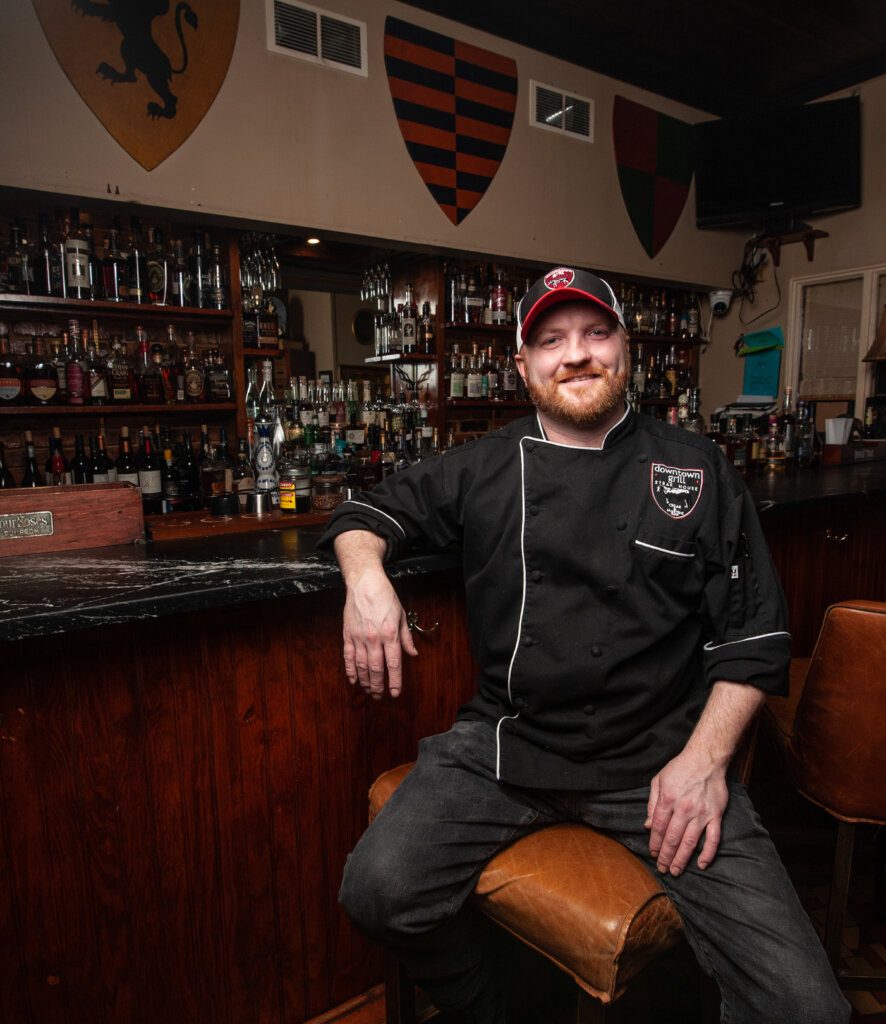
MIKE REYNOLDS
Mike Reynolds, a born-and-bred Maconite, has been manning the Downtown Grill bar for 12 years. He also manages, cooks on the sauté line, and wears whatever other hat the day demands. With a gruff sense of humor and a nonjudgmental ear, he’s an old-school barkeep. If you drink too many rare whiskies and spill your secrets, they aren’t going anywhere. Reynolds tells his servers what M. Gustave told Zero in The Grand Budapest Hotel: [people in the service industry are] “discreet to a fault. Our guests know that their deepest secrets, some of which are frankly rather unseemly, will go with us to our graves. So keep your mouth shut, Zero.” (Yes, Reynolds has this memorized.) Reynolds says that trustworthiness is the foundation of all good service.
But that’s not the only thing that makes his bar guests feel welcome. He also remembers the names of regulars, even if they only pass through town once a year. “It’s the Cheers Effect,” he said, referring to a customer-engagement style modeled on the friendly, close-knit community bar on the TV show, Cheers. “It’s important to remember people’s names, and if you can’t remember their name, at least remember what they drink. Restaurants are a place people come to feel connected, not just to eat.”
Guests remember Reynolds, too, and come to Downtown Grill to see him. He sees the same regulars come for big life events – a daughter’s rehearsal dinner, a meal after a grandfather’s funeral service. Reynolds takes pride in the fact that people trust him and the team at Downtown Grill to help mark these milestones in their lives. “Restaurant interactions are less transactional than other industries like retail. We don’t call them customers. We call them guests. So yes, there is a transaction in the experience, but it’s more than that. Restaurants are about relationships, guests and hosts, about taking care of people. And that human aspect goes two ways. Guests get much more out of the experience when they treat us as hosts, not food-delivery robots. And when a guest becomes a regular, they become family.”
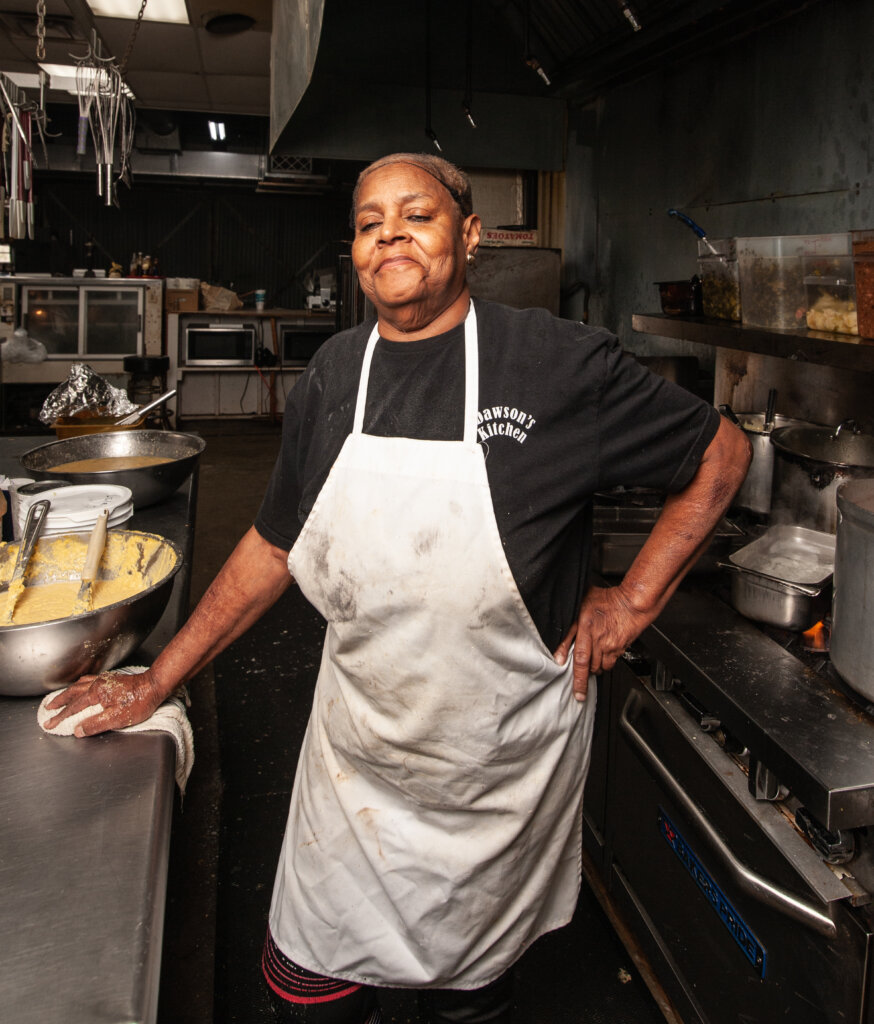
PATSY BIVINS
Patsy Bivins has been cooking and kitchen-managing at Dawson’s for 25 years, and has been working in kitchens for 53. She’s the proud mom of 3 daughters and a son, a grandmother, and at one point, she was taking care of 11 people in her household while working full-time. She’s an incredible woman who has shared a lot of love in her lifetime. “I give everything I cook my personal guarantee. And I don’t put my guarantee on just anything. But I love what I do, and I cook with love. So the food tastes like love, and that’s a guarantee.”
The guarantee is backed by a loyal following. “I’ve been here at Dawson’s doing things my way for 25 years. And for 25 years, it’s been satisfactory to the people. I’ve had near 100 men come in here and ask, ‘Is you married? I can take you home with me?’ People come here from Atlanta or Augusta to try my cooking. Now I don’t know how they hear about us, but I feel proud when they tell me that.”
Miss Pat plans to retire in the next few years so she can spend more time with her family in Savannah – and her son’s taking her to the Bahamas to celebrate. As kitchen manager, she’s confident that the next generation at Dawson’s will cook just as well. If you want to taste the dressing and mac and cheese that have garnered Miss Pat all those marriage proposals, cooked by the legend herself, put Dawson’s lunch on your calendar soon.
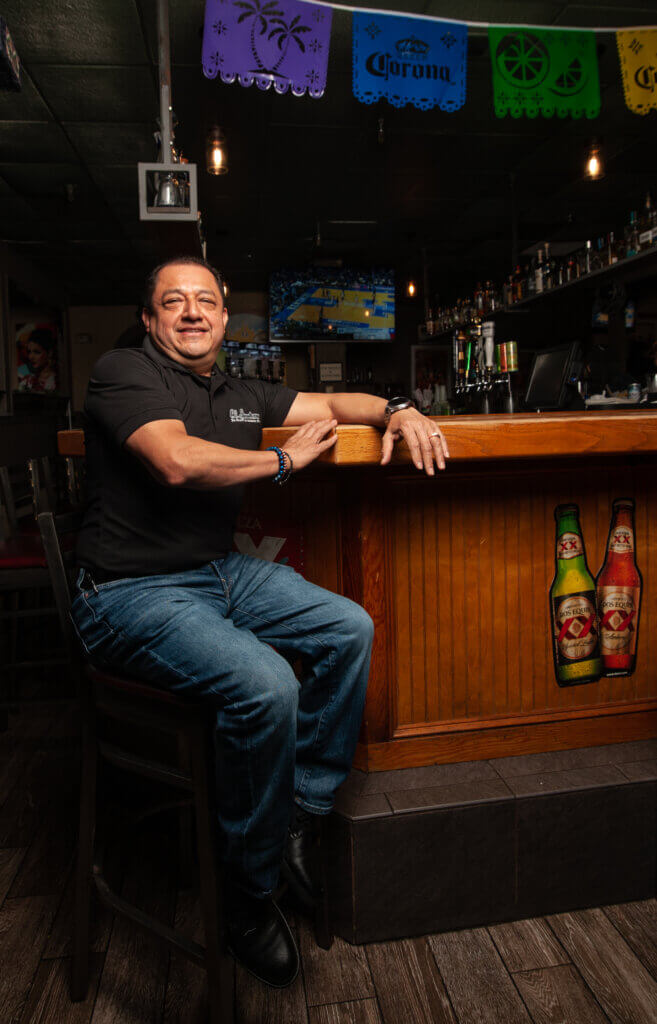
EDUARDO (LALO) HERNANDEZ
Lalo is the margarita master most often behind El Sombero’s busy bar on Forsyth Rd. He’s been bartending there for 14 years. Orginally from Mexico City, he loves to share his passion for spirits (especially good tequila and cognac) while making bar patrons laugh and keeping the shift rolling smoothly, one fresh cocktail at a time.
“Even though it gets busy and stressful at times, working at a restaurant is a fun experience. Joking with customers and coworkers, the adrenaline of rush-hour, taking care of the regular customers that come in daily and getting to know the new people that come to visit—working at a restaurant has become a key piece in my life. As a bartender, I like perfectionism above all. As a part-time manager, I like to have fun with the customers and employees, always making sure everybody is enjoying their time here.”
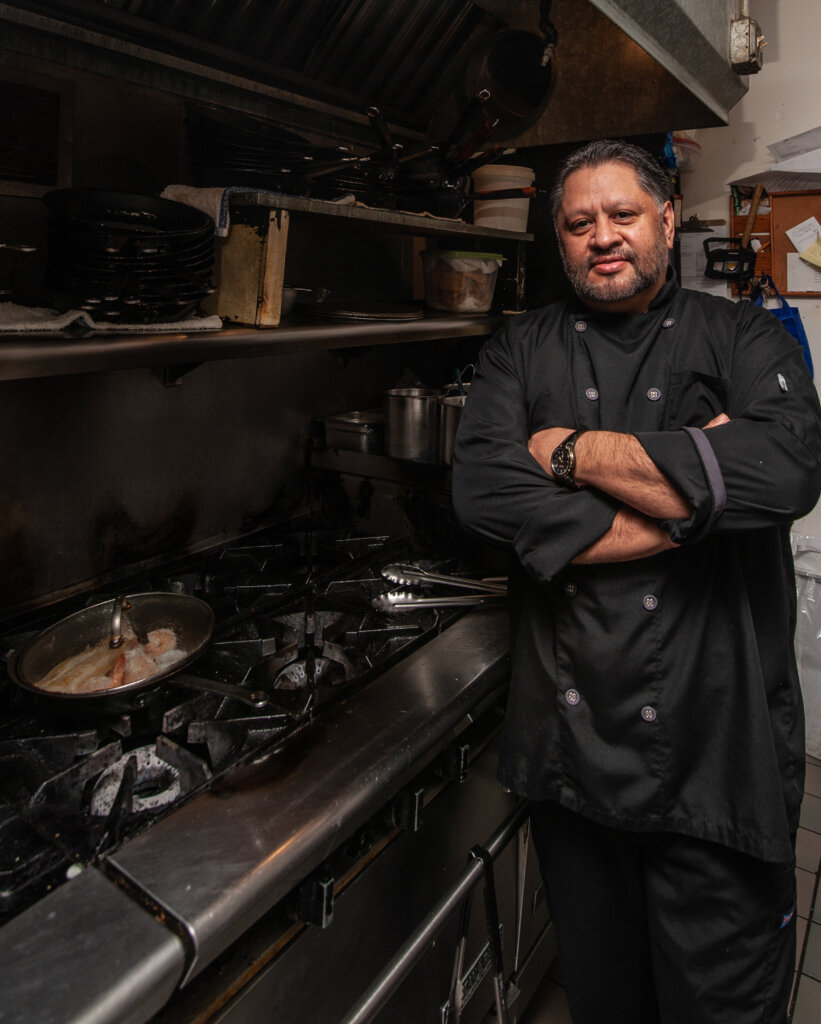
JULIO ROSAS
As the Mexican chef-owner of a French restaurant in a soul food city, you might expect Julio Rosas to be a big-splash kind of person, an outspoken maverick. But Rosas has a gentle, centered energy, and he doesn’t like the pressure of the spotlight. So for 25 years, he’s been quietly becoming one of Macon’s finest culinary leaders.
When Rosas was 19, he immigrated from Puebla, Mexico to Macon. He got a job washing dishes at Carrabba’s then began cooking on the line.
What first attracted him to cooking was, “the recipes, the books.” Rosas loved cookbooks for the way they allow us to transmit memory and flavor through time and culture onto a page, and then bring that page to life in another kitchen. But Rosas spoke Spanish, and he was working in an English-speaking kitchen.
“Everything I used to learn, I write it,” he shares. Even when Rosas was exhausted, with oven burns on his writing hand, he’d carefully write the Carrabba’s recipes using the English he knew. Between long shifts, Rosas studied. “Every time I go out, I come back home with a book. Every single time.” Rosas’s passion for crafting and documenting recipes never waned. He didn’t know back then that he would make a career of cooking, but he knew his hard work was valuable, and he held onto the guide he was writing for himself. “I still have those copies with me, those recipes.”
About a year into his first job, Rosas still didn’t see himself as a career chef, and he didn’t realize his work was paying off. But his dedication and talent spoke for itself. Rosas’ Carrabbas colleague, Tom Noelke, asked Rosas to join the opening team of his new downtown restaurant, Midtown Grill (now Downtown Grill). Rosas also assisted Noelke in opening Gulf Coast Grill, then worked with Michael Taylor when he opened Michael’s on Mulberry. Later, in a post he’d hold for 10 years, he became Tic Toc’s executive chef.
Tic Toc had an open kitchen, and Rosas could see the dining room while plating Filet Oscar and carving prime rib. While it wasn’t quite Tik-Tok-fancy enough to be on the menu, Rosas did a “Secret Burger” during happy hour. It was especially popular with a group of therapists who met a few times a month at Tik-Tok after work. But after a while, he decided the secret menu item was too much trouble, and he told the staff that the burger would no longer be available. “Except,” Rosas explained, “if the beautiful red-head therapist ever comes and is asking for one. For her, I will make it.”
She did come asking for one, and that was the start of a beautiful friendship. Karen and Julio later married, and in 2015, the Rosas purchased The Back Burner. The best part about owning his own business? “My freedom,” Rosas sighs, tangibly relishing the word.
When working for other restaurants, he explains, “everything was always about being number one. We have to be better, the food has to be better, than everyone, all the time.” Being the “best” isn’t what Rosas values. “It was too much pressure. Pressure all the time.”
As a small business owner, there’s always pressure to perform well. His livelihood and the livelihood of his employees depend on his smart decisions and leadership. And running a restaurant isn’t easy. It’s a a complex logistical web: ordering, scheduling, food cost management, staffing, maintaining equipment, bookkeeping—not to mention the creative responsibility of menu creation and the interpersonal know-how of managing people and public relations. But at least now, Rosas doesn’t have pressure from above to always be perfect, always be collecting accolades.
“I don’t think in that way,” he continues. “Now I do clean cooking, my own style. No one can put the pressure like that on me anymore.”
Instead, Rosas is able to take all the knowledge he gained in the 17 years working in others’ kitchens, plus the eight years he’s spent cooking freely at The Back Burner, to develop that style at a pace and in a way that feels authentic to him. He’s able to approach dishes from a place of curiosity and personal connection.
In addition to reading and writing recipes, Rosas learned the most about cooking from asking good questions and paying close attention to what others in his Central Georgia community had to teach him. “I was never was shy to ask something,” he says, discussing how he learned different cuisines and methods. “What are the flavors, how do you do this thing, that thing,” he said, laughing. “Always with the questions, never stopping.” Rosas brings the same centered, humble energy he had early in his career to his craft today. “I always pay attention to people. It’s always something you can learn from them,” he said. “Ask anyone, ‘How does this taste to you?’ and ‘How did your grandma make it?’”
Those questions help him discover how to create dishes that his guests will enjoy. “People from Macon, they know their food.” It brings him joy to bring others joy through delicious food. “When you take the time, the hard work, and the knowledge to put together a plate, they will say, ‘this is good. This is not someone just dropping a plate [because it’s easy].’” Over the years, he’s learned to trust his system. If he approaches food with humility and curiosity, his dishes will reflect his delicious worldview.
He keeps the menu at The Back Burner mostly French-focused because he enjoys cooking and watching his guests enjoy its classic dishes.
He’s carved a space out in Central Georgia’s food scene that allows him to take what he enjoys from French cooking (like delicate sauces), English steakhouses (he makes a mean prime rib), Italian pastas (try the lobster ravioli), and the complex flavor-layering of his native Puebla.
He can bring fresh energy and experimentation to the table by adding “flavors from my city, from Puebla,” and trying dishes from his library of cookbooks any time he likes. The seafood paella is a knockout example. “I cannot take it out of the menu,” he laughs. It’s that popular, even though it’s not French — and he added some Mexican chiles to the stock pot.
The food that coalesces from these differing backgrounds doesn’t taste like a hodgepodge. Like America developed a national identity composed of layered and intertwined cultures, Rosas’ food blends what he’s known into something distinctly, singularly his own.
A big part of that identity is being a Maconite. “I’m proud to be from here. I’ve spent more of my life in Macon than in Mexico,” Rosas says. It hasn’t always been easy, he continues, “but it was always more people pushing me forward than the ones who stepped on me.” He’s proud of his work, his beautiful and generous wife, Karen, and that no one who knows him will ever have to be hungry. But what he’s most proud of is that Macon is his home. “I don’t want to sound fake. Maybe people think this is fake because you hear it in stories about people who come to this country,” he says. “A lot of people talk about the American Dream. But the American Dream — Macon is the one who gave it to me. That comes from my heart. I am so proud to be from here.”
Julio Rosas’s food comes from that heart. If you’re looking for what makes Macon’s food uniquely soulful, go see him.




